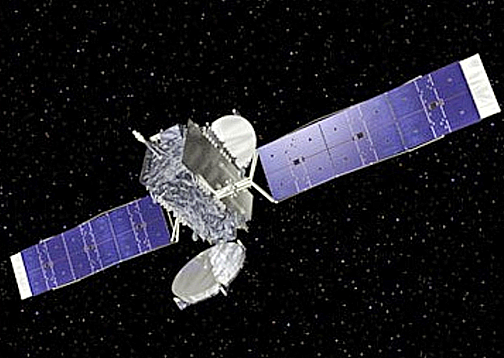
KT Corp. (KRX: 030200; NYSE: KT) has reported that their satellite-operating subsidiary, KT SAT, has successfully conducted the world’s first 5G data transmission with a satellite connection.
The test was aimed to expand the fifth generation technology linked to KT’s 5G network and KT SAT’s KOREASAT 6, located some 36,000 kilometers above the equator, said the leading Korean telecom provider.
KT SAT and the KT Institute of Convergence Technology executed the project together. They implemented “hybrid terrestrial-satellite 5G transmission,” which combines different networks to deliver data better than typical 5G service, and “5G edge cloud media transmission using satellite communications backhaul links.” That meshes satellite communications with the content delivery network (CDN) for video transmissions from the 5G edge cloud.

Artistic rendition of KT SAT's KOREASAT-6 satellite.
The 5G edge cloud can be seen as a virtual data center. It handles data generated from user terminals at the nearest possible spot in order to maximize the 5G capacity for ultra-low latency. The key to hybrid satellite-terrestrial 5G transmission is a router jointly developed by the KT institute and KT SAT. 5G terminals connected to this device can simultaneously transmit and receive various data, or use separate routes, to and from a 5G network and a satellite.
KT SAT, by using this technology, successfully maintained normal service operations with KOREASAT 6 alone, after the 5G network was intentionally disconnected. The test showed how the hybrid 5G transmission technology can enable 5G-based automated machinery or moving vehicle to maintain its network connection when 5G coverage becomes unavailable, or a natural disaster has occurred.
Currently, KT SAT operates five communication satellites – KOREASAT 5, 5A, 6, 7 and 8. They offer coverage to some 60 percent of the Earth's total surface area.
By using satellite communications backhaul links, KT SAT transmitted real-time streaming data and live video camera footage from its Kumsan Satellite Service Center to the 5G edge cloud at the KT Research and Development Center in Umyeon-dong, Seoul. The transmission was through KOREASAT 6, resulting in seamless data transmission to multiple 5G terminals.
This latest technology enables simultaneous content transmission to all smartphones accessible in the same bandwidth, whereas conventional satellite communications can only provide the transmission of high-definition (HD) video footage to a single smartphone within a given bandwidth. Broadcasting stations and large content companies have only been able to use satellite-based broadcast relays because satellite communication is limited in bandwidth and expensive.
KT SAT predicts that if the two technologies are commercialized, satellite communication with relatively slow speed could be boosted to provide faster, uninterrupted data transmission. It will widen opportunities for many users in countries with less developed communications systems to access high-quality content.
KT SAT explained the objective of its research in satellite 5G is achieving a complete interconnection of 5G NR (New Radio) and satellite communications, by devising global standards for the technology of interconnecting satellite and 5G. KT SAT and the KT institute are reporting the test results to the organization's 3rd Generation Partnership Project (3GPP) during the first half of 2020.
Satellite 5G is one of the research subjects encouraged by the international specification organization under its 2018 initiative, “3GPP Release 16.” Many experts in the communications field expect that global standardization efforts for satellite 5G will begin in earnest in 2020, under the 3GPP Release 17 initiative, based on results of the current research.
Hahn Won-Sic, President of KT SAT, said meshing satellite and 5G will create communication environments without regional gaps, greatly contributing to both disaster and emergency communication and content markets where communication is essential. Through continued technological exchange with KT, the company will strive to achieve global technological standardization and provide good customer service.
Jeon Hong-Beom, KT’s EVP and head of the KT Institute of Convergence Technology, added that the company is very pleased to have succeeded in interlinking satellite and 5G for the first time in the world by using the 5G technologies possessed by KT Group.

